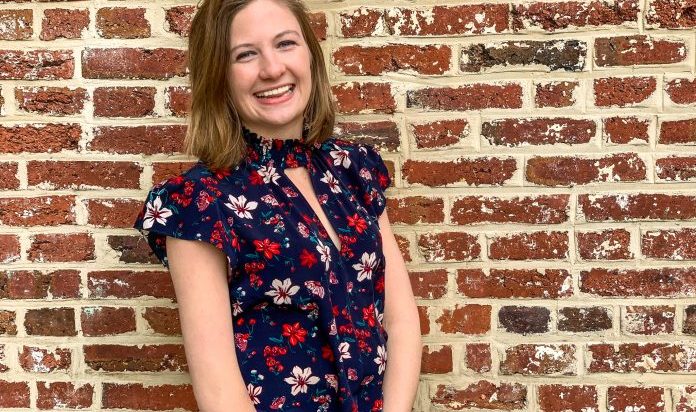5 Ways Emily Burnaman is Extending Her Coding Boot Camp Experience to the Community

Emily Burnaman worked in HR for years, leading corporate training for employees at her staffing firm. It was there that she had her first “aha” moment working with software. She trained employees with Erecruit, a staffing solutions software company, which required her to develop an intimate knowledge of the software. “I knew it like the back of my hand,” she said. “As much I enjoyed training, I found myself really drawn to the functionality and design of the software itself.”
It was more than just familiarity. Emily was inspired by the origin of the application — a success story of two MIT students working in a garage — and she had developed close relationships with the Erecruit representatives she worked with. Most of all, she admired how one idea could encompass so much, as much as managing people and activities across the globe.
Inspired by the expansive possibilities technology presented, Emily enrolled in GW Coding Boot Camp. Learn how this decision led her to become part of a community bigger than she ever thought possible — and 5 ways she stays involved with it today.
1. Building a strong network
With little development experience, Emily initially found it challenging to get accustomed to the boot camp topics. But she relied on the support of her classmates — a diverse group of learners, all with different levels of coding experience — and her instructor, Roger Le. She took full advantage of the resources available to her and was motivated by the sense of shared experience she immediately felt. “Everyone there had similar mindsets,” said Emily. “We were all seeking to learn with and alongside each other. It made group work a really collaborative, balanced experience. I absorbed all of the knowledge I could.”
2. Engaging with community-based projects
For her final group project, Emily worked with 3 other students to create HelpHub, an app that connects volunteers with organizations that match their interests, location, and more. The project sparked a passion in Emily, and she continues to do her own form of volunteering by building websites for local nonprofits like the Norwalk Tree Alliance. “Creating websites for nonprofits and organizations that are doing such good things but don’t have budgets for their websites is something I do in my free time,” said Emily. “I love front end development, and it can make a big difference for them.”
3. Getting involved with online coding groups
Emily is a member and presenter for Women Who Code, an online group that inspires women to pursue — and excel in — careers in technology. She joined when she first started the boot camp, and was immediately surprised to see how many boot camp students and alums were part of the network. She turned to the group to find resources and tutors throughout the course, and after the boot camp, she joined the chapter specific to her area for front end developers. She belongs to Women Who Code support groups, attends meet-ups, and searches the platform to see what other women are up to, even scouting out potential partners for projects down the line.
4. Working for a software-based company
Emily now works at Synergy Corporate Technologies, a company that provides digital transformation services to growing businesses. Right now, she’s building the Revelation helpdesk website, using new frameworks and leveraging her boot camp skills to help the company digitally evolve. Additionally, Emily joined with a colleague at Synergy to start their own meet-up group, Coding Literacy, that helps new coders find their footing in the field. In conjunction with live meet-ups, they’re planning to record and post webinars on the site to reach more people and forge broader connections.
5. Seeking involvement with software startups
Over the next five years, Emily wants to continue to increase her involvement in the technology community. “I would love to have my own startup software company or be on the board of one,” she said. “Being able to support and contribute to startups, and invest in software that helps people, is what I really want to do. I see the beauty in technology: its ability to help people work more efficiently, more effectively, and more collaboratively. It’s an amazing thing, and I want to help contribute to that. The boot camp definitely helped expedite and focus this realization for me — spurring my career change and setting me up to successfully pursue this path. I wouldn’t be where I am or know where I want to go without my cohort, my instructor, and the opportunities they gave me.”
 Live Chat
Live Chat